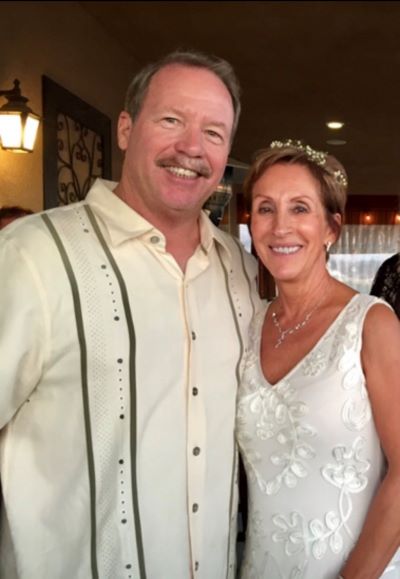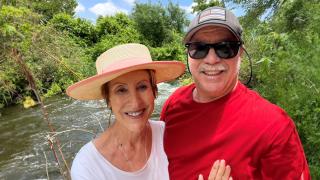Bob and Donita Gibbs live life on their own terms. Together since 2015 (“It was divine intervention that our paths crossed, Bob says) they are full-time RVers, residing aboard a 35-foot home-on-wheels that facilitates their love of travel. Loosely based in Southern California (most recently Anaheim and Newport Beach), they have plans to trek to Georgia, Tennessee and who-knows-where next.
They speak as a team. Donita will begin to answer a question, and within seconds Bob, retired from the L.A. County Sheriff's Department, will jump in, adding detail, color, narrative, opinion and more. Donita smiles.
One thing Bob likes to say again and again about his wife: “I have never seen such a tenacious person. She’s been a fighter from the very beginning.”
Donita’s “beginning” took place 68 years ago in Savannah, Georgia, where she grew up as a self-proclaimed tomboy — healthy, active and athletic. At age 5, the family moved to Iowa, where eventually Donita enrolled in nursing school. She worked in that profession for 35 years until recently switching careers, working now as an esthetician, proudly helping her clients care for their skin.
An Anal Squamous Cell Carcinoma Diagnosis
She takes care of herself as well — and it’s a good thing she does.
It was in March 2016, during a routine visit, that her doctor detected some blood and a pinhead-sized bump in Donita’s rectum. A biopsy confirmed that Donita had anal squamous cell carcinoma, a very rare malignancy — about 10,000 cases a year — that develops in anal tissues or the lining of the anal canal.
Most cases of anal cancer are believed to be caused by the human papillomavirus, or HPV. HPV is passed through sexual contact and usually does no harm. But sometimes the virus can cause changes in the cells that may lead to cancer.

The number of new anal cancer cases has been rising for many years. The HIV epidemic may be partly responsible, because people with HIV are at greater risk for HPV-related diseases.
Anal cancer is found mainly in adults over 60, most often in white women and Black men. A case made headlines in 2009 when actress Farrah Fawcett passed away from the disease at age 62.
A vaccine to prevent HPV has been available since 2006. Due to the vaccine, in the last 18 years, infections with HPV types that cause most HPV cancers and genital warts have dropped 88% among teen girls and 81% among young adult women, according to the Centers for Disease Control and Prevention. Older adults may have already been exposed to the virus, which can lie dormant in the body for years.
The standard treatment for anal cancer is chemotherapy combined with radiation, and the results are encouraging, with a better than 80% survival rate in the early stages.
Donita, however, chose a different path. She had her reasons.
“I had bad experiences with doctors before,” she explained, “and I am not fond of how cancer is treated. I wanted a more holistic approach.”
She sought out alternative practitioners who performed a variety of unconventional treatments, including cannabis oil, which she received for two years. “It kept the cancer at bay,” she claims.
But by 2018, the tumor had grown. Now Donita turned to a facility that practiced what it called “integrative” treatment, a process that combined low-dose chemotherapy drugs with various modalities ranging from intravenous selenium and mistletoe to hyperbaric oxygen and ozone therapy.
Again, the cancer appeared to stabilize. For a while. Then it began expanding once more, causing significant pain. Things were going downhill. A new mass appeared. A perforation developed inside her rectum. A pelvic abscess formed, along with an infection. Donita was given radiation and also underwent a colostomy in an attempt to remove the cancer. It wasn’t enough.
“I was frustrated,” she remembers. “I had a lot of anxiety.”
Undergoing an Abdominal Perineal Resection
She would need more extensive surgery, but the hospital treating her lacked the resources to perform it properly. This is when Donita and Bob made their way to City of Hope, noticing right away the unique atmosphere. “Everybody we came in contact with was very kind, caring and supportive,” Donita said.
Their first contact with surgeon Andreas Kaiser, M.D., was a stark reality check.

“She was scared, which was understandable,” recalled Kaiser, professor and chief of the Division of Colorectal Surgery in the Department of Surgery. “She was in so much pain, I had to examine her under anesthesia. And she looked disoriented, like no one had told her what could be done for her.
“But I felt we could get her cancer under control. There were no signs of systemwide disease. And she’d already made the biggest lifestyle adjustment” (when she had the colostomy).
It wouldn’t be easy, though. Kaiser was proposing a complex procedure known as abdominal perineal resection, or APR, in which the lower colon, rectum and anus are all removed. Additionally, to deal with her infection and ensure good margins around the cancer, Donita would need a partial sacrectomy: removal of a section of the sacrum, a bony structure at the base of the spine, a little too close for comfort to Donita’s malignancy.
It was a lot to take in, but Donita realized this was her best, possibly her only, option.
“I knew there was no way around it,” she said. “If I didn’t do this, I’d be in a world of trouble. And I wanted that cancer out.
“I didn’t expect to survive the surgery. Maybe I was punishing myself for not getting treatment sooner. I decided to try and stay in the present, and not worry about what may or may not be.”
In October 2021, Donita had the surgery. Kaiser teamed with neurosurgeon Mike Y. Chen, M.D., Ph.D., who specializes in brain and spine tumors, and plastic surgeon Wai-Yee Li, M.D., Ph.D. Li removed a flap from Donita’s abdomen and used the tissue to fill the gap created when part of Donita’s sacrum was resected. All went well.
Donita had some minor postsurgical issues, but she was able to leave the hospital after 11 days. Full recovery from such complex surgery would likely take six months to a year.
Clear Scans After Treatment
Donita continues to deal with some pain challenges, but City of Hope’s supportive care team has been helping with medications and other pain management assistance. Gradually, Donita returned to her old self, able to engage in more physical activity. Best of all, follow-up tests show no evidence of disease. “The scans are all clear!” she said joyfully.
Though he’s reluctant to give the “all clear” for Donita until five years have passed, Kaiser is delighted with his patient’s progress and what it says about City of Hope’s ability to treat advanced cancer.
“Where others stop, we get started,” he said. “It’s not something we can always promise. And we’re not always successful. But we don’t automatically write someone off.”
The Gibbses are profoundly grateful to City of Hope, and Donita also credits her faith. “I learned that I’m not in control,” she said. “God is.”
And remember that tenaciousness? Donita offered a message for others in her situation:
“Don’t give up.”
